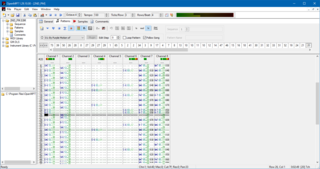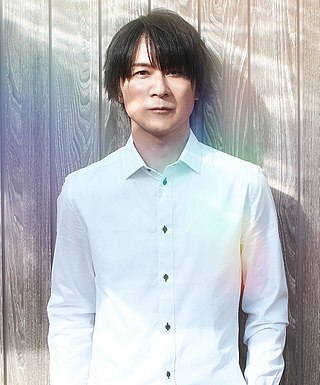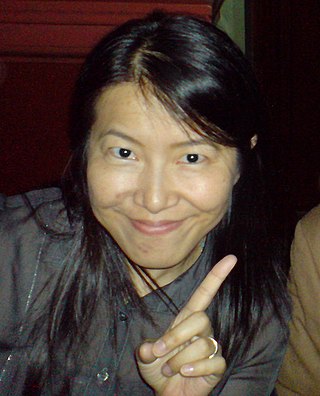
Coldcut are an English electronic music duo composed of Matt Black and Jonathan More. Credited as pioneers for pop sampling in the 1980s, Coldcut are also considered the first stars of UK electronic dance music due to their innovative style, which featured cut-up samples of hip-hop, soul, funk, spoken word and various other types of music, as well as video and multimedia. According to Spin, "in '87 Coldcut pioneered the British fad for 'DJ records'".

Ambient music is a genre of music that emphasizes tone and atmosphere over traditional musical structure or rhythm. It may lack net composition, beat, or structured melody. It uses textural layers of sound that can reward both passive and active listening and encourage a sense of calm or contemplation. The genre is said to evoke an "atmospheric", "visual", or "unobtrusive" quality. Nature soundscapes may be included, and the sounds of acoustic instruments such as the piano, strings and flute may be emulated through a synthesizer.

A music tracker is a type of music sequencer software for creating music. The music is represented as discrete musical notes positioned in several channels at chronological positions on a vertical timeline. A music tracker's user interface is traditionally number based. Notes, parameter changes, effects and other commands are entered with the keyboard into a grid of fixed time slots as codes consisting of letters, numbers and hexadecimal digits. Separate patterns have independent timelines; a complete song consists of a master list of repeated patterns.

The Future Sound of London is a British electronic music duo composed of Garry Cobain and Brian Dougans. They have been described as a "boundary-pushing" electronic act, covering techno, ambient, house music, trip hop, psychedelia, and dub.
Video game music (VGM) is the soundtrack that accompanies video games. Early video game music was once limited to sounds of early sound chips, such as programmable sound generators (PSG) or FM synthesis chips. These limitations have led to the style of music known as chiptune, which became the sound of the first video games.

"Sin" is the third single by American artist Nine Inch Nails from the album Pretty Hate Machine. Released in October 1990, the song peaked at number 35 in the UK Singles Chart.
The Black Mages were a Japanese instrumental rock band formed in 2002 by Nobuo Uematsu, Kenichiro Fukui and Tsuyoshi Sekito, who were three video game composers for Square and Square Enix. The band arranged Uematsu's Final Fantasy video game series-based compositions in a hard rock style often similar to progressive metal, achieved with the additional use of synthesizers. A year later the band expanded to six members with the addition of Keiji Kawamori, Michio Okamiya and Arata Hanyuda. In August 2010, Uematsu announced the band had been disbanded, but he would continue to perform rock arrangements of his music as a part of another similar band, known as the Earthbound Papas.
The Books were an American-Dutch duo, formed in New York City in 1999, consisting of guitarist and vocalist Nick Zammuto and cellist Paul de Jong. Their music typically incorporated samples of obscure sounds and speech. They released three critically acclaimed albums on the German label Tomlab, and released their fourth studio album, The Way Out, on Temporary Residence Limited in July 2010.

The Chrono series is a video game franchise developed and published by Square Enix. It began in 1995 with the time travel role-playing video game Chrono Trigger, which spawned two continuations, Radical Dreamers and Chrono Cross. The music of Chrono Trigger was mainly composed by Yasunori Mitsuda, with a few tracks composed by regular Final Fantasy composer Nobuo Uematsu. The Chrono Trigger soundtrack has inspired four official album releases by Square Enix: a soundtrack album released by NTT Publishing in 1995 and re-released in 2004, a greatest hits album published by DigiCube in 1999, published in abbreviated form by Tokyopop in 2001, and republished by Square Enix in 2005, an acid jazz arrangement album published and republished by NTT Publishing in 1995 and 2004, and a 2008 orchestral arranged album by Square Enix. Corresponding with the Nintendo DS release of the game, a reissued soundtrack was released in 2009. An arranged album for Chrono Trigger and Chrono Cross, entitled To Far Away Times, was released in 2015 to commemorate the 20 year anniversary of Chrono Trigger.
Final Fantasy VII is a role-playing video game by Square as the seventh installment in the Final Fantasy series. Released in 1997, the game sparked the release of a collection of media centered on the game entitled the Compilation of Final Fantasy VII. The music of the Final Fantasy VII series includes not only the soundtrack to the original game and its associated albums, but also the soundtracks and music albums released for the other titles in the collection. The first album produced was Final Fantasy VII Original Soundtrack, a compilation of all the music in the game. It was released as a soundtrack album on four CDs by DigiCube in 1997. A selection of tracks from the album was released in the single-disc Reunion Tracks by DigiCube the same year. Piano Collections Final Fantasy VII, an album featuring piano arrangements of pieces from the soundtrack, was released in 2003 by DigiCube, and Square Enix began reprinting all three albums in 2004. To date, these are the only released albums based on the original game's soundtrack, and were solely composed by regular series composer Nobuo Uematsu; his role for the majority of subsequent albums has been filled by Masashi Hamauzu and Takeharu Ishimoto.
The music of the video game Final Fantasy XII was composed primarily by Hitoshi Sakimoto. Additional music was provided by Masaharu Iwata and Hayato Matsuo, who also orchestrated the opening and ending themes. Former regular series composer Nobuo Uematsu's only work for this game was "Kiss Me Good-Bye", the theme song sung by Angela Aki. The Final Fantasy XII Original Soundtrack was released on four Compact Discs in 2006 by Aniplex. A sampling of tracks from the soundtrack was released as an album entitled Selections from Final Fantasy XII Original Soundtrack, and was released in 2006 by Tofu Records. Additionally, a promotional digital album titled The Best of Final Fantasy XII was released on the Japanese localization of iTunes for download only in 2006. "Kiss Me Good-Bye" was released by Epic Records as a single in 2006, and Symphonic Poem "Hope", the complete music from the game's end credits, was released by Hats Unlimited the same year. An abridged version of the latter piece, which originally accompanied a promotional video for the game, was included in the official soundtrack album. An album of piano arrangements, titled Piano Collections Final Fantasy XII, was released by Square Enix in 2012.

Stepfather is the fifth album by the People Under the Stairs. The album signified a departure from the group's previous, Golden age hip hop sound, and the album introduced a more widely varied array of sample sources. The album also spawned two singles, "Tuxedo Rap" and "Pass The 40".
The Mana series, known in Japan as Seiken Densetsu, is a role-playing video game series from Square Enix, created by Koichi Ishii. The series began as a handheld side story to Square's flagship franchise Final Fantasy, although most Final Fantasy-inspired elements were subsequently dropped, starting with the second installment, Secret of Mana. It has since grown to include games of various genres within the fictional world of Mana. The music of the Mana series includes soundtracks and arranged albums of music from the series, which is currently composed of Final Fantasy Adventure and its remake Sword of Mana, Secret of Mana, Trials of Mana, Legend of Mana, Dawn of Mana, Children of Mana, Friends of Mana, Heroes of Mana, Circle of Mana, and Rise of Mana. Each game except for Friends and Circle has produced a soundtrack album, while Adventure has sparked an arranged album as well as a combined soundtrack and arranged album, Legend of Mana has an additional promotional EP, and music from Secret and Trials were combined into an arranged album. For the series' 20th anniversary, a 20-disc box set of previously-released albums was produced, as well as an album of arrangements by Kenji Ito, composer for several games in the series.
The music of the video game Final Fantasy VIII was composed by regular series composer Nobuo Uematsu. The Final Fantasy VIII Original Soundtrack, a compilation of all music in the game, was released on four Compact Discs by DigiCube in Japan, and by Square EA in North America. A special orchestral arrangement of selected tracks from the game—arranged by Shirō Hamaguchi—was released under the title Fithos Lusec Wecos Vinosec Final Fantasy VIII, and a collection of piano arrangements—performed by Shinko Ogata—was released under the title Piano Collections Final Fantasy VIII.

The music of the Kingdom Hearts video game series was composed by Yoko Shimomura with orchestral music arranged by Kaoru Wada. The original soundtracks of the games have been released on three albums and a fourth compilation album. The soundtracks to the Kingdom Hearts games feature several musical pieces from both Square Enix and Disney works, including such pieces as "Mickey Mouse Club March" by Jimmie Dodd, "This Is Halloween" by Danny Elfman, and "One-Winged Angel" by Nobuo Uematsu. They also feature several vocal songs, the most notable being the four main theme songs: "Hikari", "Passion", "Chikai", and "Face My Fears." The two themes were written and performed by Japanese American pop star Hikaru Utada; in addition to Japanese, English versions of the first three songs were produced, titled "Simple and Clean", "Sanctuary", and "Don't Think Twice", respectively.
SaGa is a series of science fiction role-playing video games produced by Square, now Square Enix. The series originated on the Game Boy in 1989 as the creation of Akitoshi Kawazu. It has since continued across multiple platforms, from the Super Nintendo Entertainment System to the PlayStation 2, and like the Final Fantasy series, the story in each SaGa game is independent of its counterparts. The music of the SaGa series consists of musical scores and arranged albums from various composers. Some of these composers have created soundtracks and pieces for other Square Enix franchises including the Final Fantasy series and Mana series. The SaGa series is divided up between the original series, released as the Final Fantasy Legend series in North America, the Romancing SaGa series, the SaGa Frontier series, and Unlimited SaGa.
CDDB, short for Compact Disc Database, is a database for software applications to look up audio CD information over the Internet. This is performed by a client which calculates a (nearly) unique disc ID and then queries the database. As a result, the client is able to display the artist name, CD title, track list and some additional information. CDDB is a licensed trademark of Gracenote, Inc.
The Mother series is a role-playing video game series created by Shigesato Itoi for Nintendo. The series started in 1989 with the Japan-only release of Mother, which was followed up by Mother 2, released as EarthBound outside Japan, for the Super NES in 1994. A second sequel was released in Japan only, Mother 3, for the Game Boy Advance in 2006. The music of the Mother series includes the soundtracks to all three games; the first game was composed for by Keiichi Suzuki and Hirokazu Tanaka, who were joined by Hiroshi Kanazu for the second game, while Mother 3's score was written by Shogo Sakai.
Katamari Damacy is a third-person puzzle-action video game that was published and developed by Namco for the PlayStation 2 video game console. The success of the game led to the release of six sequels in Japan and other territories: We Love Katamari, Me & My Katamari, Beautiful Katamari, Katamari Damacy Mobile, I Love Katamari, and Katamari Forever. It also inspired a spin-off game, Korogashi Puzzle Katamari Damacy.
"Avril 14th" is a piano instrumental by the electronic musician Richard D. James, under his pseudonym Aphex Twin, released on his 2001 album Drukqs. It was recorded using a Disklavier, a computer-controlled piano.







